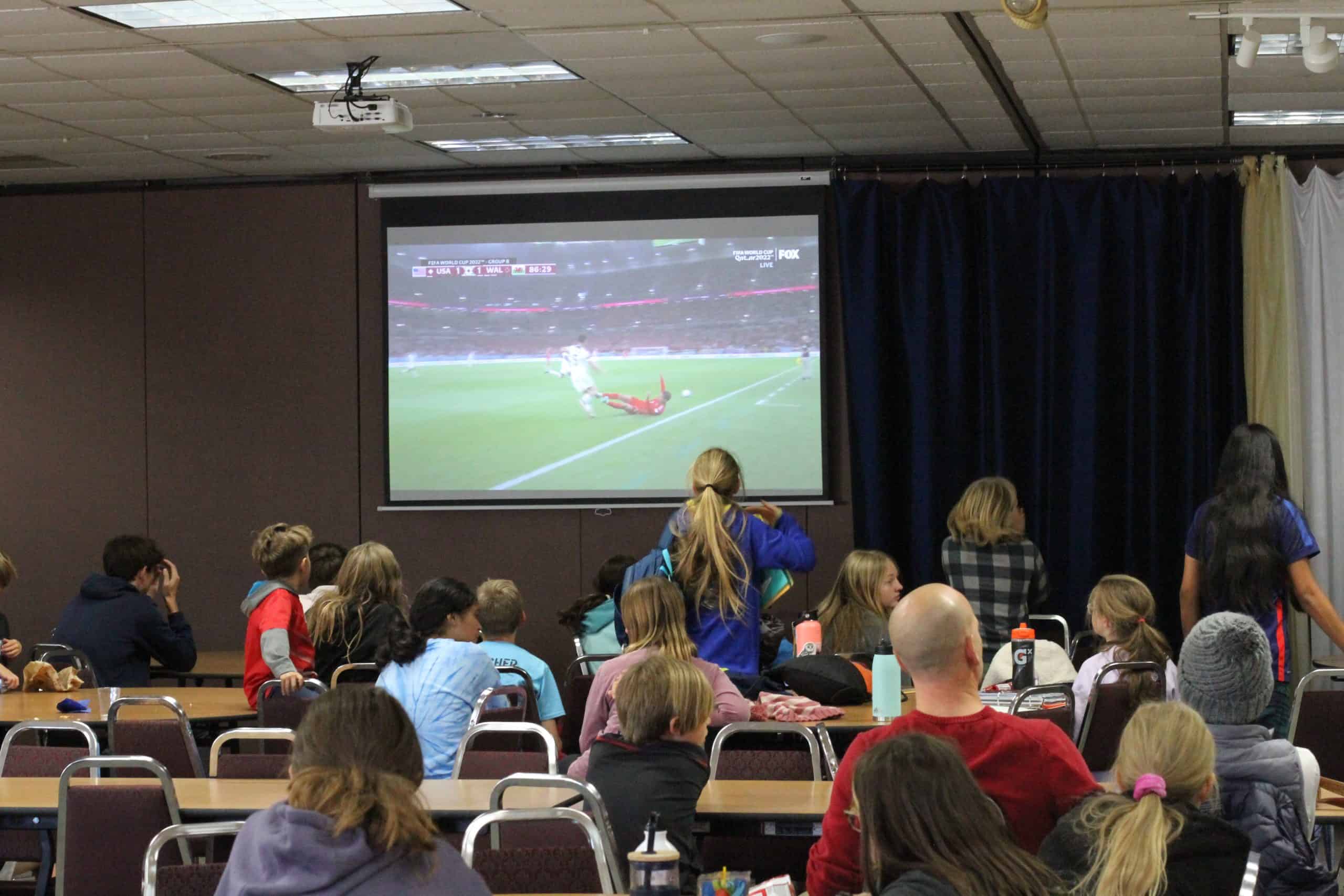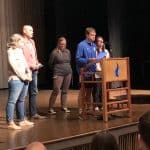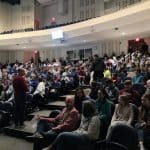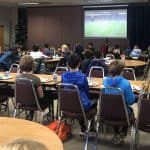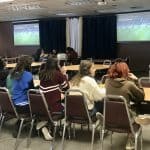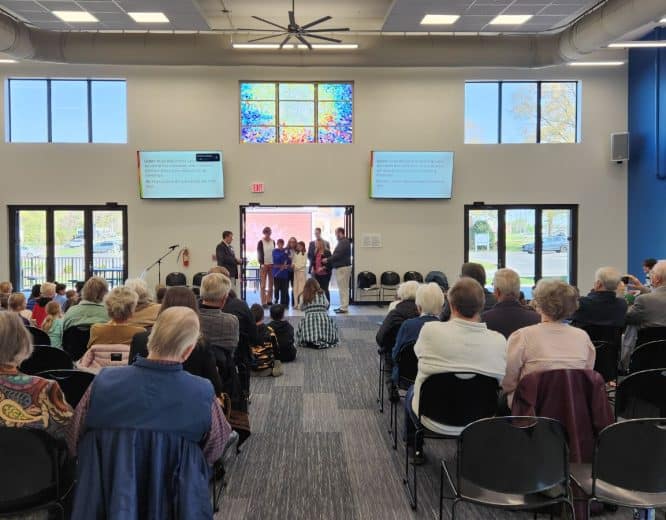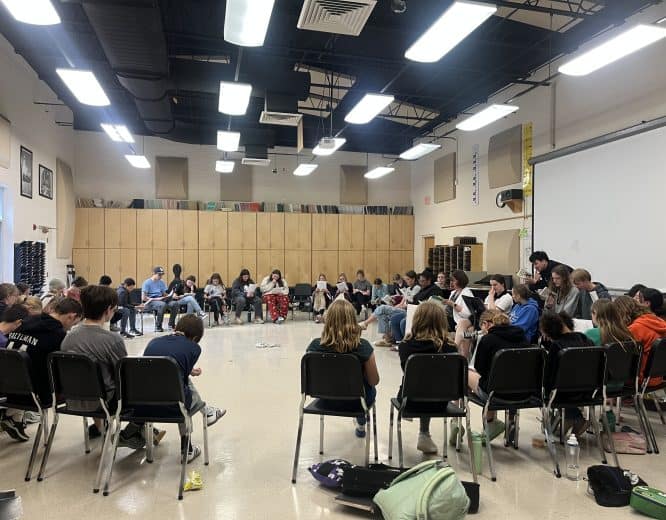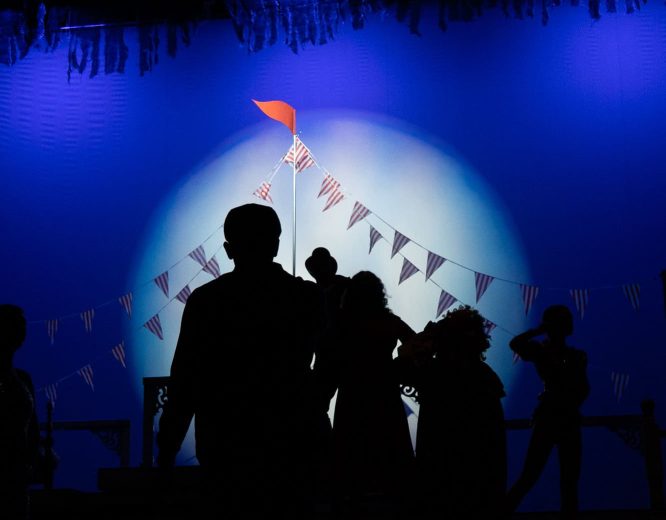En FIFA World Cup soccer tournament — set to kick off in Qartar on Sunday, Nov. 20 — is creating a buzz at Eastern Mennonite School, from both a fun and serious perspective.
The soccer-loving school, which marked its 1,000th boys varsity soccer match this past season, will stream World Cup games in the dining hall throughout the tournament for lunchtime viewing, and in a common area for students to watch during study halls.
But the “underbelly” of the games is something students are also learning about, thanks to middle and high school Bible and social studies teachers who prepared a statement (posted in full below) to share in Chapel on Friday, Nov. 18 as a lead up to the games. Following chapel, students received an email with several resources, including links to the Netflix documentary series, Fifa Uncovered and the Equal Times’ five minute undercover video of life at Qatar Labor Camp.
Conversation following the chapel presentation continued in classes, reported teachers, who included Benjamin Bixler (high school Bible), Leah Huyard (6th grade), Shannon Roth (high school history and government), Zach Sauder (7th grade), and Karen Suderman (high school Bible).
Statement read in Chapel, Nov. 18, 2022
It is an exciting month as the world awaits the beginning of the 2022 Men’s FIFA World Cup held in Qatar. Fans from all over the world will be watching the beautiful game and sharing their cultures and customs with one another. We will hold great highs and lows in common as we come together across language, race, and culture to celebrate the world’s greatest sporting event. Soccer. Football. The game of the people.
We do, however, want to take a moment this morning to acknowledge that the big business of mega sports comes at a price – a price that we ourselves do not pay. Under the celebration and fanfare of these wonderful events, lies injustice that needs to be seen and acknowledged. More than 6,500 immigrant workers have died in Qatar since 2011 building stadiums and infrastructure to host the tournament. Workers that have survived are lucky if they are paid for their labor. When they are paid, their wages equal about $200USD a month, a meager sum that doesn’t cover the cost of living in Qatar which, for a single person, is estimated over $800USD per month not including rent. All the while, according to data from the world bank, Qatar ranks the 8th highest GDPs per capita globally and boasts a lavish lifestyle to a watching world. Unable to make a living wage, some workers tried to leave, however, they found themselves bound. Their passports were taken upon entering the country, effectively imprisoning them in an unjust system.
Preparations for FIFA tournaments have been fraught with corruption and injustice. South Africa in 2010, amongst other things, saw the displacement of local street vendors to an 8 km (5 mile) radius of any stadium. These vendors, selling everything from fresh cooked food to coat hangers to team merchandise, depend on the regular foot traffic of their neighborhood to earn a living. Their displacement, and replacement with FIFA “certified” vendors, cut off their access to any possible benefit from the trickle down economics promised by business owners and event organizers. Likewise, Brazil (2014) displaced low income inhabitants to create a ‘clean’ aesthetic for game attendees. Also, Russia, 2018 saw similar human rights abuses under a restrictive and repressive regime.
Sadly, equal atrocities occur in our own sports and entertainment as well. The National Football League, Men’s National Basketball Association, and National League Women’s Soccer have all recently dealt with scandals where corrupt owners have exploited people based on race, gender, and economic status. We have a collegiate athletic system that, at its highest levels, operates on a system in which athletes play sports for schools who make large profits off of the student athletes, and in return, give them little to no direct payment. We acknowledge that horrible things happen to produce the games and entertainment we love.
Sport holds an amazing power to bring people together. Love of the game draws us to watch. Common passion pulls us together across borders, oceans, languages, and beliefs. This is good. We must, however, hold this in tension with systemically violent and ongoing injustice often found in the sports community. Holding true to the uniting power of sport, we need to be aware of and speak out against these injustices, and stand in solidarity with those who are suffering.
Oftentimes, in the face of such enormous issues we feel small. When injustice is so far away we feel powerless to effect any change. That is not true. To know is to be empowered. To see the problems and speak about them raises awareness about those who are suffering. Awareness, in turn, gives us new eyes to see, offering a more textured and complicated picture of these events- we see the joy and the pain. At EMS we seek to embody Jesus’ love and participate in God’s restorative work in the world. We celebrate what is wonderful and with our knowledge we have the opportunity to raise awareness of the ongoing injustice in our community. If you want to learn more, talk to any of us on stage, your teachers and parents. Do some research to see what else you can learn.
While we cannot change the past, and we acknowledge that corruption and sports washing will continue to exist, we can speak the truth about these ongoing realities. We continue to celebrate the gathering of world cultures around the game, we grieve with the families of the workers whose lives were lost, and we cry out against the injustice that prevents equal pay and fair treatment for all. We have faith that God will use us as instruments of peace and justice. We live in the hope that we can change these injustices within our own country and around the world.
